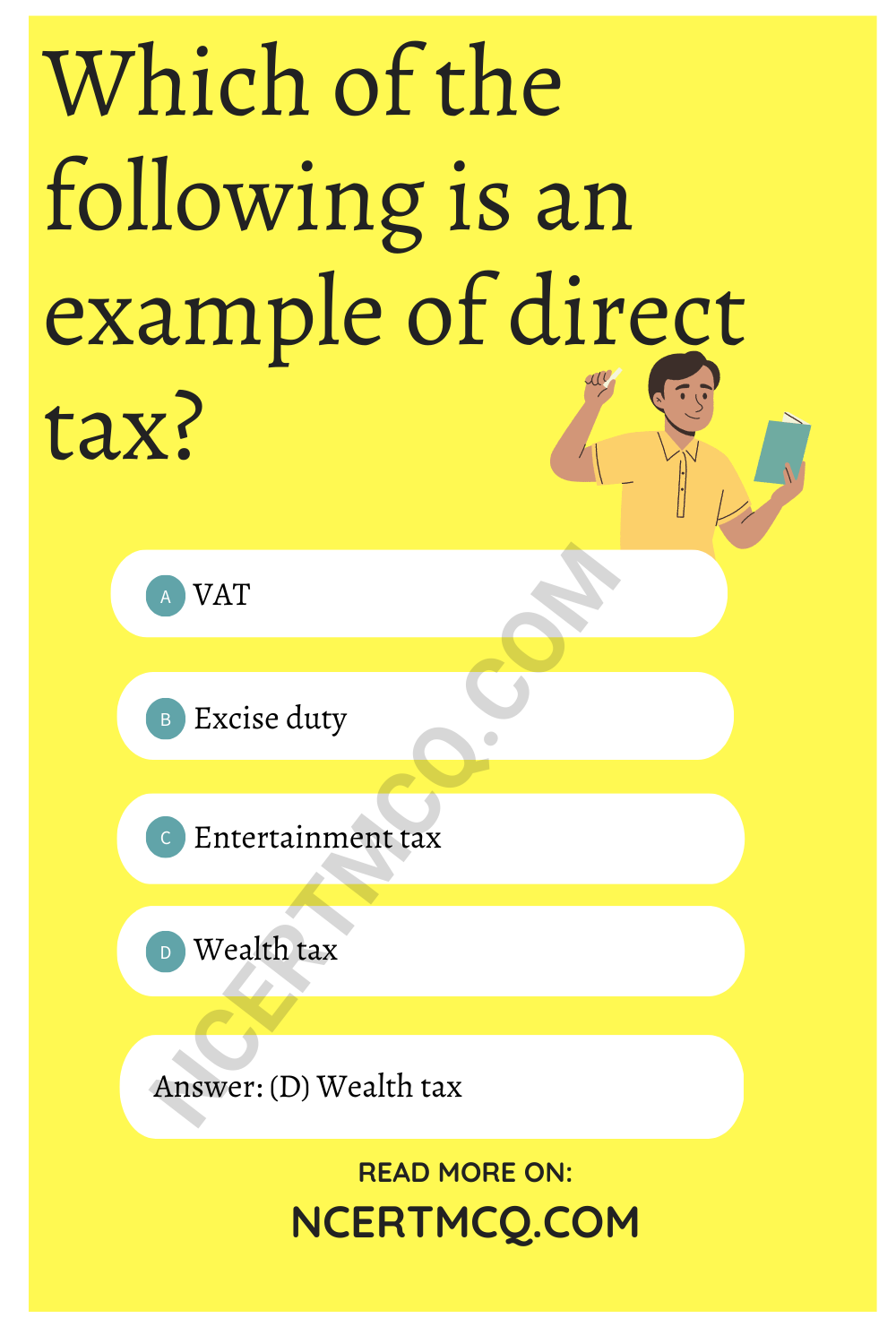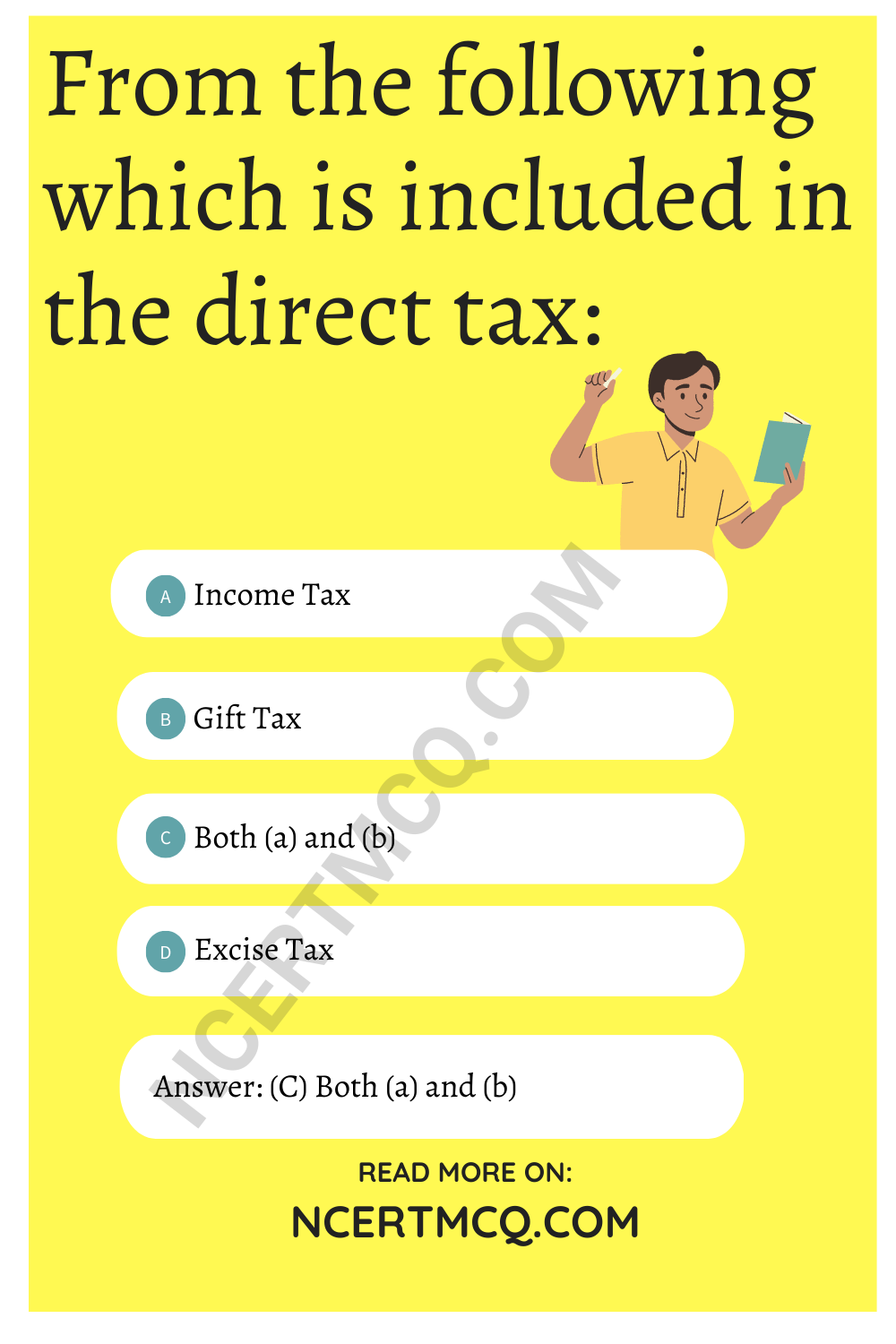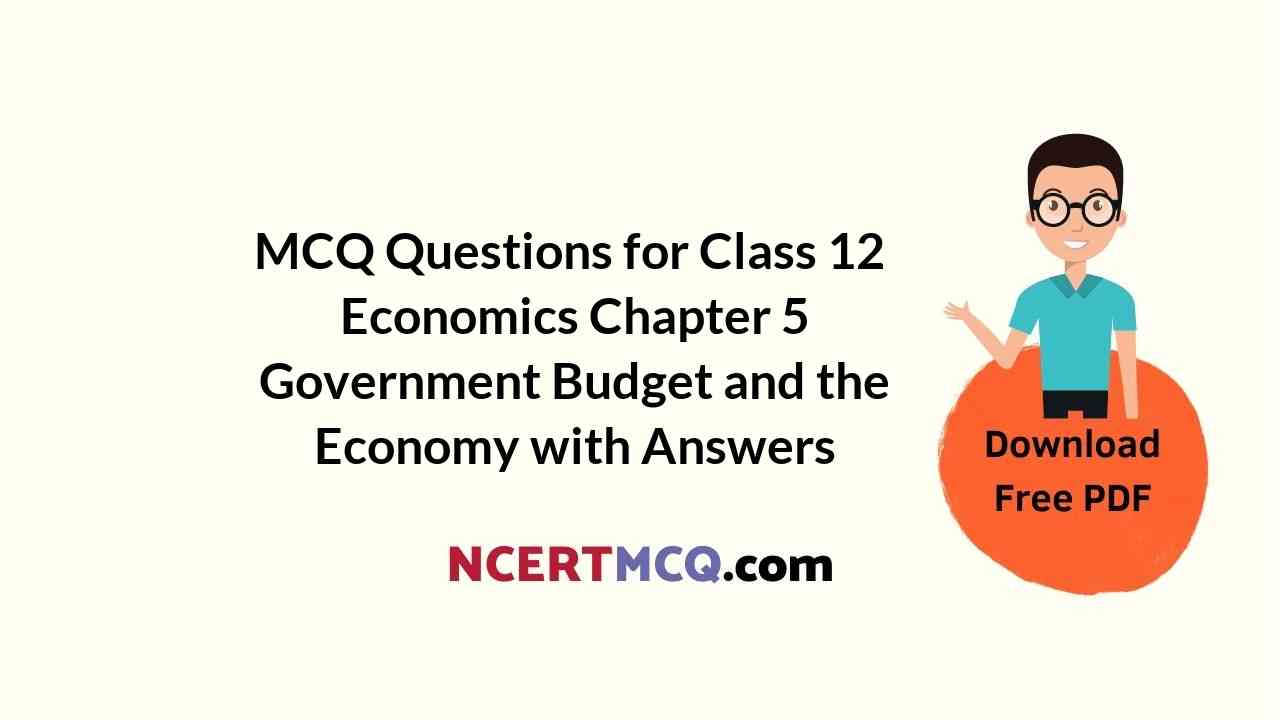Check the below NCERT MCQ Questions for Class 12 Economics Chapter 5 Government Budget and the Economy with Answers Pdf free download. MCQ Questions for Class 12 Economics with Answers were prepared based on the latest exam pattern. We have provided Government Budget and the Economy Class 12 Economics MCQs Questions with Answers to help students understand the concept very well.
Class 12 Economics Chapter 5 Government Budget and the Economy MCQ With Answers
Economics Class 12 Chapter 5 MCQs On Government Budget and the Economy
Government Budget Class 12 MCQ Question 1.
An annual statement of the estimated receipts and expenditure of the government over the fiscal year is known as
(A) Budget
(B) Income estimates
(C) Account
(D) Expenditure
Answer
Answer: (A) Budget
Government Budget And The Economy Class 12 MCQ Question 2.
Which of the following is an example of direct tax?
(A) VAT
(B) Excise duty
(C) Entertainment tax
(D) Wealth tax
Answer
Answer: (D) Wealth tax

Govt Budget Class 12 MCQ Question 3.
What is the period of a fiscal year?
(A) 1 April to 31 March
(B) 1 January to 31 December
(C) 1 March to 28 February
(D) None of these
Answer
Answer: (A) 1 April to 31 March
Government Budget MCQ Class 12 Question 4.
When government spends more than it collects by way of revenue, it incurs ______
(A) Budget surplus
(B) Budget deficit
(C) Capital expenditure
(D) Revenue expenditure
Answer
Answer: (B) Budget deficit
Government Budget And The Economy MCQ Question 5.
The fiscal deficit is the difference between the government’s total expenditure and its total receipts excluding ______
(A) Interest
(B) Taxes
(C) Spending
(D) Borrowings
Answer
Answer: (D) Borrowings
MCQ On Government Budget Class 12 Question 6.
Which of the following is the component of a budget?
(A) Fiscal budget
(B) Capital budget
(C) Both of these
(D) None of these
Answer
Answer: (C) Both of these
Government Budget MCQ Question 7.
What is the annual statement of the government’s fiscal revenue and fiscal expenditure known?
(A) Budget
(B) Fiscal Budget
(C) Capital Budget
(D) All of these
Answer
Answer: (B) Fiscal Budget
MCQ Of Government Budget Class 12 Question 8.
How many types of revenue receipts are there?
(A) 2
(B) 3
(C) 4
(D) 6
Answer
Answer: (A) 2
Government Budget Class 12 MCQs Question 9.
The amount collected by the government as taxes and duties is known as _______
(A) Capital receipts
(B) Tax revenue receipts
(C) Non-tax revenue receipts
(D) All of these
Answer
Answer: (B) Tax revenue receipts
Class 12 Government Budget MCQ Question 10.
The amount collected by the government in the form of interest, fees, and dividends is known as ________
(A) Tax-revenue receipts
(B) Capital receipts
(C) Non-tax revenue receipts
(D) None of these
Answer
Answer: (C) Non-tax revenue receipts
MCQ Of Government Budget Question 11.
Borrowing in the government budget is:
(A) Revenue deficit
(B) Fiscal deficit
(C) Primary deficit
(D) Deficit in taxes
Answer
Answer: (B) Fiscal deficit
MCQ Of Chapter Government Budget Class 12 Question 12.
The non-tax revenue in the following is:
(A) Export duty
(B) Import duty
(C) Dividends
(D) Excise
Answer
Answer: (C) Dividends
Government Budget And Economy Class 12 MCQ Question 13.
The primary deficit in a government budget will be zero, when _______
(A) Revenue deficit is zero
(B) Net interest payments are zero
(C) Fiscal deficit is zero
(D) Fiscal deficit is equal to interest payment
Answer
Answer: (D) Fiscal deficit is equal to interest payment
Class 12 Economics Government Budget MCQ Question 14.
Direct tax is called direct because it is collected directly from:
(A) The producers on goods produced
(B) The sellers on goods sold
(C) The buyers of goods
(D) The income earners
Answer
Answer: (D) The income earners
MCQ On Government Budget Class 12 Pdf Question 15.
Financial Year in India is:
(a) April I to March 31
(b) January 1 to December 31
(c) October 1 to September 30
(d) None of the above
Answer
Answer: (a) April I to March 31
MCQ Of Govt Budget Class 12 Question 16.
Which objectives government attempts to obtain by Budget
(a) To Promote Economic Development
(b) Balanced Regional Development
(c) Redistribution of Income and Wealth
(d) All the above
Answer
Answer: (d) All the above
Government Budget Class 12 MCQ Questions Question 17.
Which is a component of Budget?
(a) Budget Receipts
(b) Budget Expenditure
(c) Both (a) and (b)
(d) None of the above
Answer
Answer: (c) Both (a) and (b)
Question 18.
Which is a component of the Budget Receipt?
(a) Revenue Receipt
(b) Capital Receipt
(c) Both (a) and (b)
(d) None of the above
Answer
Answer: (c) Both (a) and (b)
Question 19.
Tax revenue of the Government includes :
(a) Income Tax
(b) Corporate Tax
(c) Excise Duty
(d) All of these
Answer
Answer: (d) All of these
Question 20.
Which is included in the Direct Tax?
(a) Income Tax
(b) Gift Tax
(c) Both (a) and (b)
(d) Excise Duty
Answer
Answer: (c) Both (a) and (b)
Question 21.
Which is included in Indirect Tax?
(a) Excise Duty
(b) Sales Tax
(c) Both (a) and (b)
(d) Wealth Tax
Answer
Answer: (c) Both (a) and (b)
Question 22.
The expenditures which do not create assets for the government is called :
(a) Revenue Expenditure
(b) Capital Expenditure
(c) Both (a) and (b)
(d) None of the above
Answer
Answer: (a) Revenue Expenditure
Question 23.
Direct tax is :
(a) Income Tax
(b) Gift Tax
(c) Both (a) and (b)
(d) None of these
Answer
Answer: (c) Both (a) and (b)
Question 24.
In India, one rupee note is issued by:
(a) Reserve Bank of India
(b) Finance Ministry of Government of India
(c) State Bank of India
(d) None of these
Answer
Answer: (b) Finance Ministry of Government of India
Question 25.
Capital budget consist of:
(a) Revenue Receipts and Revenue Expenditure
(b) Capital Receipts and Capital Expenditure
(c) Direct and Indirect Tax
(d) None of these
Answer
Answer: (b) Capital Receipts and Capital Expenditure
Question 26.
Which of the following is an indirect tax?
(a) Excise Duty
(b) Sales Tax
(c) Custom Duty
(d) All of these
Answer
Answer: (d) All of these
Question 27.
Which type of expenditure is made in bridge construction?
(a) Capital Expenditure
(b) Revenue Expenditure
(c) Both (a) and (b)
(d) None of the above
Answer
Answer: (a) Capital Expenditure
Question 28.
Which of the following budget is suitable for developing economies?
(a) Deficit Budget
(b) Balanced Budget
(c) Surplus Budget
(d) None of these
Answer
Answer: (a) Deficit Budget
Question 29.
What is the duration of a Budget?
(a) Annual
(b) Two Years
(c) Five Years
(d) Ten Years
Answer
Answer: (a) Annual
Question 30.
Which of the following is included in fiscal policy?
(a) Public Expenditure
(b) Tax
(c) Public Debt
(d) All of these
Answer
Answer: (d) All of these
Question 31.
Which of the following is the capital expenditure of the government?
(a) Interest Payment
(b) Purchase of House
(c) Expenses on Machinery
(d) All of the above
Answer
Answer: (a) Interest Payment
Question 32.
The budget may include:
(a) Revenue Deficit
(b) Fiscal Deficit
(c) Primary Deficit
(d) All of these
Answer
Answer: (d) All of these
Question 33.
Which of the following statement is true?
(a) Fiscal deficit is the difference between total expenditure and total receipts
(b) Primary deficit is the difference between total receipt and interest payments
(c) Fiscal deficit is the sum of primary deficit and interest payment
(d) All of these
Answer
Answer: (c) Fiscal deficit is the sum of primary deficit and interest payment
Question 34.
Budget:
(a) is a description of income-expenditure of government
(b) is a document of the economic policy of the government
(c) is a description of non-programs of the government
(d) All of these
Answer
Answer: (d) All of these
Question 35.
In an unbalanced budget:
(a) Income is greater than expenditure
(b) Expenditure is higher relative to income
(c) Deficit is covered by loans or printing of notes
(d) Only (b) and (c)
Answer
Answer: (d) Only (b) and (c)
Question 36.
Which is included in indirect tax?
(a) Income tax
(b) Wealth tax
(c) Excise Duty
(d) Gift tax
Answer
Answer: (c) Excise Duty
Question 37.
Which one of the following is a pair of direct tax?
(a) Excise duty and Wealth Tax
(b) Service Tax and Income Tax
(c) Excise Duty and Service Tax
(d) Wealth Tax and Income Tax
Answer
Answer: (d) Wealth Tax and Income Tax
Question 38.
Which of the following is not a revenue receipt?
(a) Recovery of Loans
(b) Foreign Grants
(c) Profits of Public Enterprise
(d) Wealth Tax
Answer
Answer: (a) Recovery of Loans
Question 39.
Which of the following is a correct measure of the primary deficit?
(a) Fiscal deficit minus revenue deficit
(b) Revenue deficit minus interest payments
(c) Fiscal deficit minus interest payments
(d) Capital expenditure minus revenue expenditure
Answer
Answer: (c) Fiscal deficit minus interest payments
Question 40.
The duration of the Government budget is:
(a) 5 years
(b) 2 years
(c) 1 year
(d) 10 years
Answer
Answer: (c) 1 year
Question 41.
Budget is presented in the Parliament by:
(a) Prime Minister
(b) Home Minister
(c) Finance Minister
(d) Defence Minister
Answer
Answer: (c) Finance Minister
Question 42.
Budget speech in Lok Sabha is given by:
(a) President
(b) Prime Minister
(c) Finance Minister
(d) Home Minister
Answer
Answer: (c) Finance Minister
Question 43.
Professional tax is imposed by:
(a) Central Government
(b) State Government
(c) Municipal Corporation
(d) Gram Panchayat
Answer
Answer: (b) State Government
Question 44.
From the following which is included in the direct tax:
(a) Income Tax
(b) Gift Tax
(c) Both (a) and (b)
(d) Excise Tax
Answer
Answer: (c) Both (a) and (b)

Question 45.
Who issues 1 rupee note in India:
(a) Reserve Bank of India
(b) Finance Ministry of India
(c) State Bank of India
(d) None of these
Answer
Answer: (b) Finance Ministry of India
Fill in the blanks:
Question 1.
A deficit budget is that in which total expenditure is ________ total receipts.
Answer
Answer: greater than
Question 2.
Revenue deficit is that in which revenue receipts are ________ revenue expenditure.
Answer
Answer: less than
Question 3.
_______ tax is that in which the final burden of the tax fall on the person who pays it.
Answer
Answer: Direct
Question 4.
Tax is a legally compulsory payment imposed by the _______ on income and property of persons and companies.
Answer
Answer: Government
Question 5.
Recovery of loan is treated as capital receipt because it leads to __________
Answer
Answer: reduction of assets
Question 6.
Primary Deficit = Fiscal Deficit minus __________
Answer
Answer: Interest on Debt
Question 7.
________ are levied on goods and services.
Answer
Answer: Indirect taxes
Question 8.
_________ does not have any impact on the asset-liability status of the government.
Answer
Answer: Revenue budget
Question 9.
The government can influence the allocation of resources through the implementation of appropriate _________
Answer
Answer: fiscal policy
Question 10.
__________ is a document containing income and expenditure of the government.
Answer
Answer: Budget
Question 11.
Income tax is _________ tax.
Answer
Answer: Direct
Question 12.
_________ tax is levied on the value of the goods.
Answer
Answer: Advalorem
Question 13.
Service tax is levied by the ________
Answer
Answer: Central
Question 14.
_________ budget is considered good for the country.
Answer
Answer: Deficit
Question 15.
Finance bill contains _________ proposals.
Answer
Answer: Tax
Question 16.
Government budget is presented on the last day of _________
Answer
Answer: February
State true or false :
Question 1.
Public goods are collectively consumed.
Answer
Answer: True
Question 2.
There is a feasible way of excluding anyone from enjoying the benefits of public goods.
Answer
Answer: False
Question 3.
The three functions of allocation, redistribution, and stabilization are operated through the expenditure and receipts of the government.
Answer
Answer: True
Question 4.
The deficit decreases in a recession and increases in a boom, even without any change in fiscal policy.
Answer
Answer: False
Question 5.
Indirect taxes are not convenient to realise.
Answer
Answer: False
Question 6.
Payment of salaries to the government employees is a capital payment.
Answer
Answer: False
Question 7.
Expenditure made on the establishment of the metro rail line in Delhi is a capital expenditure.
Answer
Answer: True
Question 8.
Public borrowing is a capital receipt.
Answer
Answer: True
Question 9.
Recovery of loan is a revenue receipt.
Answer
Answer: False
Question 10.
Service tax is a direct tax.
Answer
Answer: False
Question 11.
Grants by the government are treated as revenue expenditure.
Answer
Answer: True
Question 12.
Excess of capital expenditure over capital receipt is called revenue deficit.
Answer
Answer: False
Question 13.
A deficit budget is not considered a good budget.
Answer
Answer: False
Question 14.
Electricity tax is levied by the State Government.
Answer
Answer: True
Question 15.
The budget speech is given by the Finance Minister.
Answer
Answer: True
Question 16.
Central excise duty is a direct tax.
Answer
Answer: False
Question 17.
The interest payment is a planned item.
Answer
Answer: False
Question 18.
During deflation surplus budget is made.
Answer
Answer: True
Question 19.
The rail budget is generally not included in the annual budget.
Answer
Answer: True
Match the following
Question 1.
| ‘A’ | ‘B’ |
| 1. Income and expenditure of the government | (a) 31 March |
| 2. First of all finance bill is presented in the | (b) Budget |
| 3. Budget is presented on | (c) Details about income and expenditure |
| 4. Aim or Objective of the budget | (d) Lok sabha |
| 5. Main feature of the budget | (e) Economic development. |
Answer
Answer:
| ‘A’ | ‘B’ |
| 1. Income and expenditure of the government | (b) Budget |
| 2. First of all finance bill is presented in the | (d) Lok sabha |
| 3. Budget is presented on | (a) 31 March |
| 4. Aim or Objective of the budget | (e) Economic development. |
| 5. Main feature of the budget | (c) Details about income and expenditure |
Question 2.
| Column-I | Column-II |
| 1. Surplus budget | (A) Revenue receipts > Revenue expenditure |
| 2. Deficit budget | (B) Fiscal deficit – interest payments |
| 3. Revenue deficit | (C) Govt. Expenditure < Govt. Receipts |
| 4. Fiscal deficit | (D) Income tax, corporate profit tax |
| 5. Primary deficit | (E) Expenditure on roads and health |
| 6. Examples of direct tax | (F) Govt. Expenditure > Govt. Receipts |
| 7. Examples of indirect tax | (G) Loans granted to state governments |
| 8. Examples of development expenditure | (H) Total expenditure > total receipts |
| 9. Examples of non-development expenditure | (I) Sale tax, excise duty |
| 10. Examples of capital expenditure | (J) Sales tax, Income tax |
| 11. Sources of tax revenue | (K) Expenditure on administration and defence |
Answer
Answer:
| Column-I | Column-II |
| 1. Surplus budget | (C) Govt. Expenditure < Govt. Receipts |
| 2. Deficit budget | (F) Govt. Expenditure > Govt. Receipts |
| 3. Revenue deficit | (A) Revenue receipts > Revenue expenditure |
| 4. Fiscal deficit | (H) Total expenditure > total receipts |
| 5. Primary deficit | (B) Fiscal deficit – interest payments |
| 6. Examples of direct tax | (D) Income tax, corporate profit tax |
| 7. Examples of indirect tax | (I) Sale tax, excise duty |
| 8. Examples of development expenditure | (E) Expenditure on roads and health |
| 9. Examples of non-development expenditure | (K) Expenditure on administration and defence |
| 10. Examples of capital expenditure | (G) Loans granted to state governments |
| 11. Sources of tax revenue | (J) Sales tax, Income tax |
We hope the given NCERT MCQ Questions for Class 12 Economics Chapter 5 Government Budget and the Economy with Answers Pdf free download will help you. If you have any queries regarding CBSE Class 12 Economics Government Budget and the Economy MCQs Multiple Choice Questions with Answers, drop a comment below and we will get back to you soon.
Class 12 Macroeconomics with Answers MCQ:
